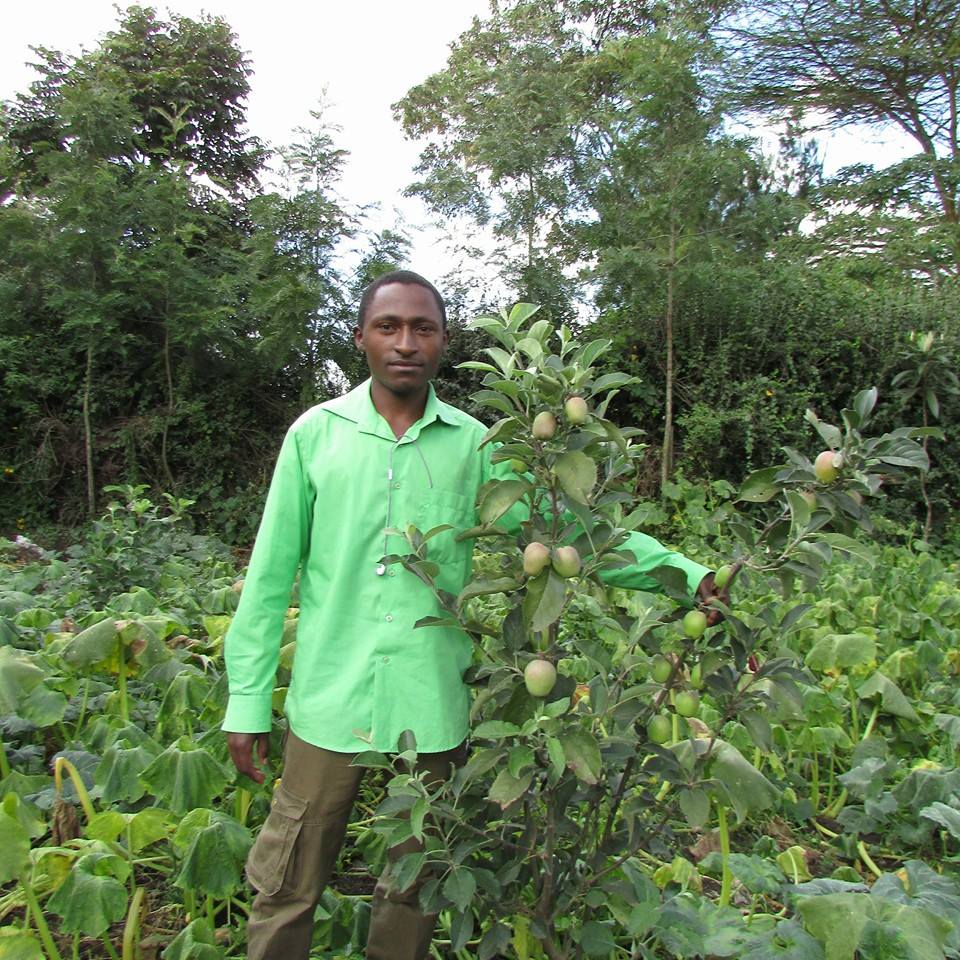 Peter Wambugu in his farm at Dobet in Laikipia County. The farmer grows different apple varieties which take 8-9 months to mature. Photo courtesy.
Peter Wambugu in his farm at Dobet in Laikipia County. The farmer grows different apple varieties which take 8-9 months to mature. Photo courtesy.
When Peter Wambugu was retrenched in 2016 by Kenya Red Cross Society (KRCS) he decided to go into self-employment through apple farming, a venture which is currently earning him Sh7,600 per tree much more than about Sh800 he used to pocked daily from the society.
After his graduation in 2010 from Institute of Advanced Technology (IAT) in Nairobi, Wambugu volunteered at KRCS for about four years before getting his full time employment at the society’s warehouse department at its headquarter at South C.
“I was being paid Sh300 per day at the start in 2015. As time went by, the figure increased to Sh25,000 net salary income per month,” said the 30 years old Diploma in Business Information and Technology graduate.
RELATED CONTENT: Fact sheet on apple farming
However, this was short lived because by August 2016 he would be retrenched alongside other workers due to what Wambugu says were financial issues at KRCS.
“I just woke up one day to work when our human resource person informed us that we would no longer work for the society which was downsizing on the number of employees due to poor financial status,” he said.
Lucky he had saved Sh250,000 the money he got as allowances during his volunteering work and part of the salary during his service. He used Sh50,000 to build a house on an eighth plot part of a three-acre farm he was bequeathed by his father back in Dobet village, Laikipia County.
He then spent another Sh50,000 to install water for irrigation from Dobet Water Self Help Group which taps water from Aberdare Forest. The group which has 400 members charges Sh200 service fee every month from the users.
RELATED CONTENT: Grafted apple varieties that yield quality fruits in one year
In addition, Wambugu spent another Sh50,000 to buy manure which is mostly the goats’ dropping from the surrounding farmers, Sh30,000 on labour and Sh10,000 to pay grass cutters and transporting the grass from a community forest in Laikipia.
“I used the grass for mulching because the area is always hot during dry seasons and with little water from the forest, I can manage to grow my crops as this practice (mulching) helps me save the plants from losing much water,” said Wambugu.
The lucky farmer also got his first seedlings fom his father whom he says that for the last 40 years has been an apple farmer. These seedlings include red pitch, Wambugu and semi-arid apple (Princesa apples) varieties.
RELATED CONTENT: Farmer selling grafted apple varieties that mature within one year
He first planted 100 trees and after 8-9 months when the plants had grown to a height of 20ft, he would begin harvesting the first fruits which were ranging between 20-50 fruits per tree.
“During the first harvest the trees give few fruits because they are still young and have few branches but as they grow bigger the yields increases to between 150 and 200 fruits per tree. The trees have a longer lifespan of 80 years of production,” said Wambugu.
Currently, the farmer is enjoying the rainfall period which being witnessed in most parts of Kenya and the trees are at a vegetative stage.
He expects them to begin fruiting by September and by January he will start harvesting the fruits for a market at Karen along Ngong Road, Nairobi. The traders either come to the farm to collect the fruits or they pay via mobile money transfer for the fruits, transport and delivery.
RELATED CONTENT: High-yielding grafted apples for low rainfall regions
He sells a kilo of the fruits at Sh400 whereby a kilo comprises of 8-9 fruits. Besides, he also sells different apple variety seedlings at Sh1,000 each.
Wambugu who is now his own boss is advising farmers to use goats’ manure to grow the fruits as it is safer because it does not burn the trees as compared to chicken manure.
Peter Wambugu can be reached on +254 27964458
















Comments powered by CComment